15th Annual Conference of Human Dignity and Humiliation Studies
'Peace at Home, Peace in the World'
28th - 30th April 2010,
in Istanbul, Türkiye
See here:
• The final report of the conference (English and Turkish)
• A short programme for the conference
• Newsletter 15 written after this conference
• Press Release (English and Turkish)
• Public Event flyer (English and Turkish) for print-out
• Announcement of the conference by the Directorate General of Press and Information of the Prime Minister of the Republic of Turkey
• If you wish to participate in our conferences, please email us!
• Istanbul Photos "Is it possible not to like that city?" by Dilek Ozçelik
Venue: Boğaziçi University, South Campus

• 28th-29th April 2010, Two-day Conference in the Rectorate Hall
• 30th April 2010, Public Event in the Albert Long Hall/BTS & BTS Fuaye (see English and Turkish flyer)
Local Host, Organiser, and Convener
Hayal Köksal, Ph.D.(please see her blog and the Istanbul Photos "Is it possible not to like that city?" by Dilek Ozçelik that dear Hayal sent us!)
(Important note to our conference particants: During our conference, we asked for your permission to be posted here, however, if you changed your mind, either in total or for specific pictures/videos, please let us know! Thank you! Since we wish to walk the talk of dignity, it is very important for us to do our utmost in respecting everybody's privacy. We refrain from gathering written permissions from you during our conferences, since we value the building of mutual trust in relationships, and we also would like to refrain from contributing to an ever more bureaucratic and legalistic society.v)
Organising Organisations (alphabetic order):
• Boğaziçi University, Peace Education and Research Center (BUPERC)
• The Association for Continuous Improvement (Sü Ge Der)
• Turkish Center for Schools of Quality• Quality and Peace Education Center (Kalbe-Mer)
Supporters
• Office of the Prime Minister, Directorate General of Press & Information
• Friedrich-Ebert-Stiftung Association Turkey Office
• Boğaziçi Catering
• Fora Tourism
• Doğan Advertising
• Klas Tourism
• Kuru Kahveci Mehmet Effendi
• Cultural and Collaborative Society of Artists and Art-Lovers (SANSEV)
• Mimar Sinan Fine Arts University, Conservatory• Sariyer Municipality-City Council
• We warmly thank Hayal Köksal husband Servet for his generous support!
• We also thank Demirsöz Kubilay and Mehmet Gül for their generous support!
Accomodation Options• Kilyos Burç Hotel (Social Building), Kilyos Saritepe Campus, Boğaziçi University, Uskumrukoy, Kilyos, Istanbul
• Taxim Hill Hotel, Taksim/Beyoğlu, Istanbul
• Frame
• List of Conveners
• Programme
• List of Participants
• Papers
• How to get to the conference venue, and where to stay
• What happened in our previous meetings? Please see Newsletters!
Frame
by Linda Hartling, 2004
In our meetings we aim at creating a humiliation-free, collaborative learning environment characterised by mutual respect, mutual empathy, and openness to difference. The perspective of "appreciative enquiry" is a useful frame of our work. Our HumanDHS efforts are not just about the work we do together, but also about HOW WE WORK TOGETHER. At appropriate points during our meetings, for example at the end of each day, we take a moment to reflect on the practices observed that contributed to an appreciative/humiliation-free learning experience.
It is important to emphasise that an appreciative approach is not about expecting people to agree. In fact, differences of opinion enrich the conversation and deepen people's understanding of ideas. Perhaps, this could be conceptualised as "waging good conflict" (Jean Baker Miller), which means practicing radical respect for differences and being open to a variety of perspectives and engaging others without contempt or rankism. As we have seen in many fields, contempt and rankism drain energy away from the important work that needs to be done. Most people only know "conflict" as a form of war within a win/lose frame. "Waging good conflict," on the other side, is about being empathic and respectful, making room for authenticity, creating clarity, and growth.
Please read An Appreciative Frame: Beginning a Dialogue on Human Dignity and Humiliation, that Linda has written for us in 2005.
Please see also Appreciative Facilitation: Hints for Round Table Moderators, kindly written in February 2006 by Judith Thompson to support the moderators of our workshops.
Please see furthermore Buddhist Teachings on Right Speech, kindly provided to us by Thomas Daffern in 2006, relating to our quest for appreciative enquiry, caring and being.
List of Conveners
Evelin Gerda Lindner, Medical Doctor, Clinical and Social Psychologist, Ph.D. (Dr. med.), Ph.D. (Dr. psychol.), Organiser of the HumanDHS Conferences, Supporting the Local Conveners
Evelin Gerda Lindner is the Founding President of the Human Dignity and Humiliation Studies (HumanDHS) network and initiator of the World Dignity University initiative. She is a transdisciplinary social scientist and humanist who holds two Ph.D.s, one in medicine and one in psychology. In 1996, she designed a research project on the concept of humiliation and its role in genocide and war. German history served as starting point. She is the recipient of the 2006 SBAP Award and 2009 "Prisoner’s Testament" Peace Award. She is affiliated with the University of Oslo, Norway, with its Department of Psychology (folk.uio.no/evelinl/), furthermore, with the Columbia University Conflict Resolution Network (CU-CRN), which was superseded, in 2009, by the Advanced Consortium on Cooperation, Conflict, and Complexity (AC4) at Columbia University, New York. She is also affiliated with the Maison des Sciences de l'Homme in Paris. Lindner is teaching globally, including in South East Asia, the Middle East, Australia, Africa, and other places globally. [read more]
Linda Hartling, Ph.D., Social Psychologist, Organiser of the HumanDHS Conferences, Supporting the Local Conveners
Dr. Linda M. Hartling is the Director of Human Dignity and Humiliation Studies (HumanDHS). She is also a Member of the HumanDHS Global Advisory Board, HumanDHS Global Core Team, HumanDHS Global Coordinating Team, HumanDHS Research Team, and HumanDHS Education Team. She is the Editor of the Journal of Human Dignity and Humiliation Studies (JHDHS).
Hartling is affiliated with the Jean Baker Miller Training Institute (JBMTI) at the Stone Center, which is part of the Wellesley Centers for Women at Wellesley College in Massachusetts.
Until November 2008, she was its Associate Director. Hartling is a member of the JBMTI theory-building group advancing the practice of the Relational-Cultural Theory, which is a new model of psychological development. In addition, Hartling coordinates and contributes to training programmes, publications, and special projects for the JBMTI. She holds a doctoral degree in clinical/community psychology and has published papers on resilience, substance abuse prevention, shame and humiliation, relational practice in the workplace, and Relational-Cultural Theory. [read more]
Please see:
• Humiliation: Real Pain, A Pathway to Violence, the draft of Linda's paper for Round Table 2 of our 2005 Workshop on Humiliation and Violent Conflict, Columbia University, New York.
• Humiliation: Assessing the Impact of Derision, Degradation, and Debasement, first published in The Journal of Primary Prevention, 19(4): 259-278, co-authored with T. Luchetta, 1999.
• Shame and Humiliation: From Isolation to Relational Transformation, the Jean Baker Miller Training Institute (JBMIT), Wellesley Centers for Women, Wellesley College No. 88, Wellesley, MA 02481, co-authored with Wendy Rosen, Maureen Walker, Judith V. Jordan, 2000.
• Humiliation and Assistance: Telling the Truth About Power, Telling a New Story, paper prepared for the 5th Annual Conference of Human Dignity and Humiliation Studies 'Beyond Humiliation: Encouraging Human Dignity in the Lives and Work of All People', in Berlin, 15th -17th September, 2005.
Hayal Köksal, Ph.D., Host, Organiser and Convener
Hayal Köksal, Ph.D. is a
• Member of the HumanDHS Global Advisory Board, and the HumanDHS Education Team.
• Consultant of Educational Quality, Leadership & Project Management
• Director General (Turkey) WCTQQ
• President, Quality & peace Education Center (KALBEMER)
• President, Associaition for Continuous Improvement (Sü Ge Der)
• Director, Turkish Center for Schools of Quality
• Founding Member Bog(aziçi University, Peace Education and Research Center (BUPERC)
• Turkish Founder of the “WCTQEE-CMS-KALBEMER” Initiative for Peace education
• www.hayalkoksal.com/konvan
• www.kalbemer.com
• www.kaliteokullari.com
• www.bilisimcimartilar.com
• www.sugeder.org
Hayal Köksal is a teacher-trainer, researcher, and author. She is the Turkish Founder of the “ WCTQEE-CMS-QOMER Initiative for Peace Education.” She is the advisor and coordinator of the Innovative Teachers Program of Microsoft Turkey, and consultant of Educational Quality, Leadership and Project Management. Dr. Köksal was born in Balikesir, Turkey in 1956. She graduated from Izmir Teachers' Training College in 1976, and Educational Faculty of Marmara University in 1985. She received her MA in English Language Teaching from Gaziantep University in 1992, and her Ph.D. in Educational Sciences in 1997 from the same institution. [read more]
Please see From the Past to the Future: Istanbul and Her Sister European Capitals of Culture by Hayal Köksal.
28th-29th April 2010: Closed Part of the Conference in the Rectorate Hall
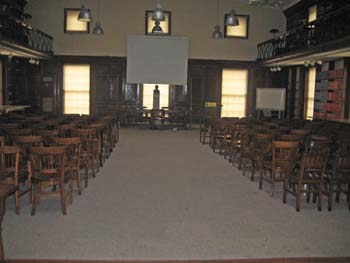
This is the Rectorate Hall. It has 100 seats.
Please click on the picture above or here to see more photos.
Day One, 28th April 2010
8.30-9.00 Registration
Welcome by Dr. Kadri Ozcaldiran, Rector of Boğaziçi University


On 28th April 2010, Dr. Kadri Ozcaldiran, Rector of Boğaziçi University welcomed everybody.
• Please click on the pictures at the top or here to see all the photos of Day One from Evelin's camera.
• Please click on the pictures at the bottom or here to see all the photos of Day One from Hayal's camera.
See also Hayal's blog!
9.00-9.40 Hayal Köksal and Linda Hartling welcomed everybody to the closed part of our conference and explained our appreciative frame
Linda M. Hartling usually welcomes everyody and sets the frame of our conferences within "Appreciative Enquiry" (until his sad passing in 2007, she did this together with Donald Klein). Please read An Appreciative Frame: Beginning a Dialogue on Human Dignity and Humiliation, that Linda has written for us in 2005.
Linda keeps our workshops together with her continuous caring interventions and her wisdom carries our conferences through crucial moments.
Linda selected the following Turkish proverbs for our conference:
1. This proverb is to recognize the importance of collaboration: "Baş başa vermeyince taş yerinden kalkmaz." Literal translation: "The stone will not move from its place, unless you cooperate," meaning "Hard tasks can be accomplished by collaboration." See also "Bir elin nesi var, iki elin sesi var."
2. This proverb is about understanding when we make mistakes: "Hatasiz Kul Olmaz." Literal translation: "Flawless human is impossible," meaning: "Nobody is perfect."
9.40-10.30 Participants presented themselves
10.30-10.45 Tea break
10.45-11.00 Musical contribution by Gulcan Yeten playing Bağlama (a Turkish musical instrument with three double strings played with a plectrum). Thanks most warmly!

• Please click on the picture or here to see all the photos of Day One from Hayal's camera.
• Please click here to see all the photos of Day One from Evelin's camera.
11.00-12.15 Introductory presentation: Who We Are and Our Latest News
Evelin G. Lindner, Founding President of HumanDHS
This talk explains the overall aim of the HumanDHS work (please read a transcription). It then highlights how globalisation is interlinked with new and unprecedented psychological dynamics that call for novel solutions at all levels - macro, meso and micro levels - and in all fields of public policy.
Please see background material:
- From Shock to Awe: The World on a Trajectory from Humiliation to Dignity - A List of “Factoids” Paper presented at the 15th Annual Conference of Human Dignity and Humiliation Studies (HumanDHS), in Istanbul, Türkiye, 28th-30th April 2010.
- In Times of Globalization and Human Rights: Does Humiliation Become the Most Disruptive Force? In the Journal of Human Dignity and Humiliation Studies, Volume 1, Number 1, March 2007. (please see an earlier version here or at http://ssrn.com/abstract=668742, this paper's SSRN ID is 668742)
- The video-taped introductory lecture Dignity or Humiliation: The World at a Crossroad, given at the University of Oslo, Norway, on January 2009
12.15-13.30 Lunch
13.30-15.00 Launch of Open Space Sessions
Our Open Space Sessions are usually launched by Linda M. Hartling. Please read here more about the Open Space idea and what it entails. The idea emerged from the observation that the coffee breaks are oftenthe most productive parts of conferences. We, as HumanDHS team, draw on the Open Space idea, and adapt it, to dignify our conferences. Open Space means developing the schedule of the conference on the first day. In order to make this process smooth, we depend on the kind understanding, support, and flexibility of all conference contributors and participants as we co-creatively collect the topics for our Open Sessions and make the programme for the rest of our conference.
15.00-15.15 Tea Break
15:15-16:45 Open Space Session 1
• How Can We Realise "Peace at Home, Peace in the World?" by Hayal Köksal
• The Role of Dignity and Humiliation for Conflict Resolution Centres in Turkey by Hayal Köksal
• Advancing Dignity in Schools by Yoav Peck and Avi Shahaf
16:45-17:00 Closing Comments
17.30-21.00 Gala Dinner at the Vakiftepe (Social Building) of the Istanbul Technical University, overlooking the Fatih Sultan Mehmet bridge, supported by the Friedrich-Ebert-Stiftung Association Turkey Office. We extend a very warm thank you!


29th April 2010, Gala Dinner at the Vakiftepe (Social Building) of the Istanbul Technical University, overlooking the Fatih Sultan Mehmet bridge.
• Please click on the picture on the right or here to see all the photos from Sophie Schaarschmidt's camera.
End of Day One
Day Two, 29th April 2010
9.00 Welcome


• Please click on the picture on the right or here to see more photos from Linda's camera.
• Please click on the pictures on the left or here to see all the photos of Day Two from Evelin's camera.
• Humiliation in the Indian Context: Effectiveness of Zeitgeist to Inculcate Human Dignity by Kailash Tuli, Professor, Ph.D. in Psychology, Gestalt therapist, New Delhi, India
9.30-11.00 Open Space Session 2
• Crafting Gentleness?: Dynamics of Enclosure and the Transformation of Humiliation by Anthony McCann
• Advancing Dignity via the OLPC Project by Ulrich Spalthoff
11.00-11.15 Tea break
11.15-11.30 Musical contribution by the master students Özge Solar, Nil Koroglu, and Aslihan And of the "Flute" section of the "Conservatory of Mimar Sinan Fine Arts University"
We thank them and their instructor Assistant Professor Ayla Uludere for her wonderful support!


• Please click on the pictures on the left or here to see all the photos of Day One from Evelin's camera.
11.30-13.00 Open Space Session 3
• Transgenerational Legacies of Collective Violence. Observations from Germany by Uta Ottmüller
• Social Displacement by Maggie O'Neill and Moira Rogers
Three other issues were also shared by:
• Human Dignity and Humiliation in the Context of Post-War Society of Bosnia and Herzegovina by Ardian Adžanela
• Knocking the Buzzard Off the Manure Spreader by Merle Lefkoff
• Ideology as Common Sense and Humiliation in Intergroup Relations by Salman Türken
12.45 -14.15 Lunch
14.15 -15.15 Open Space Closing Session
17.30 - 20.30 Bosphorus Boat trip with fish and bread, supported by the Sariyer Municipality. We extend our warmest thanks!



29th April 2010, Bosphorus Boat trip with fish and bread, supported by the Sariyer Municipality. We extend our warmest thanks!
• Please click on the picture on the left or here to see all the photos from Evelin's camera.
• Please click on the picture in the middle or here to see all the photos from Hayal's camera.
• Please click on the picture on the right or here to see all the photos from Sophie Schaarschmidt's camera.
End of Day Two
Open Space Sessions that were suggested but did not take place
• Dignity and Humiliation in Bangladesh Mohammad Abul Kalam Azad
• The Role of Dignity and Humiliation by Chellie Kew
• Philosophy of Peace and the Evolution of a Culture of Peace in a Developing Society by Adebola Ekanola
• The Role of Dignity and Humiliation for academic, diplomatic and negotiations discourses by Antony Adolf
• The Role of Dignity and Humiliation for Positive Psychotherapy by Rukiye Hayran (already with us on 28th April)
• The Role of Dignity and Humiliation for Turkey's Road to Europe, by Demetrios Theophylactou
• Forgiveness and Reconciliation and Emotional Healing Around the World by Ani Kalayjian and Jennifer De Mucci at Meaningfulworld
Ani Kalayjian has recently edited two books:
- Mass Trauma and Emotional Healing Around the World: Rituals and Practices for Resilience, 2 vols, edited by Ani Kalayjian and Dominique Eugene, Westport, CT: Greenwood/Praeger Security International, 2009.
- Forgiveness and Reconciliation: Psychological Pathways to Conflict Transformation and Peace Building, edited by Ani Kalayjian and Raymond F. Paloutzian, New York, Springer, 2009.
- Turkish Denial of the Genocide of Armenians, Greeks, Assyrians: Transforming Humiliation into Understanding and Forgiveness (2005)
• Human Dignity Through Human Security Perspective from India’s North-East by Akhil Ranjan Dutta
• Universal Peace: Role of Family, Moral and Peace Education by Abul Basher Khan
• Gender Me (2008, a road-movie about Mansour’s voyage into the world of Islam), The Young Detectives (2008), and Det hendte i går, det hender i dag (a documentary film about mutual experiences from war, dictatorship and escape) by Nefise Özkal Lorentzen (this session can take place either in the Rectorate Hall or in the near-by Mithat Alam Film Centre in the afternoons of 28-29-30th April)
Day Three 30th April 2010: Public Event in the Albert Long Hall/BTS & BTS Fuaye (see flyers, English and Turkish)
The Albert Long Hall has 550 seats and all the classical concerts take place there.
08.30-9.00 Registration


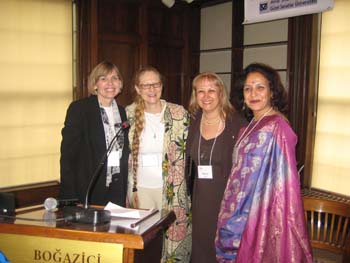
• Please click on the picture on the left or here to see all the photos from Evelin's camera.
• Please click on the picture in the middle or here to see all the photos from Hayal's camera.
• Please click on the picture at the bottom or here to see all the photos from Linda's camera.
9.00-09.30 Welcoming everybody to the public event of our conference
• Hayal Köksal, Ph.D., President of the Quality & Peace Education Center (Kalbe-Mer) & the Director of the Turkish Center for Schools of Quality
together Linda Hartling, Director of the Human Dignity and Humiliation Studies network
together Evelin Lindner, Founding Director and President of HumanDHS• Füge Demirok, sculpturer, member of the Peace Education & Research Center (BUPERC) at Bogaziçi University
• Fatos Erkman, Associate Professor, President of the Peace Education & Research Center (BUPERC) at Bogaziçi University, was with us in spirit
9.30-10.50 Four Speakers (20 minutes each)
• Appreciative Enquiry and Humiliation
Linda M. Hartling, Ph.D., Director, Human Dignity and Humiliation Studies, and Research Scientist and former Associate Director of the Jean Baker Miller Training Institute, Wellesley Centers for Women, Wellesley College
In our conferences we aim at creating a humiliation-free, collaborative learning environment characterised by mutual respect, mutual empathy, and openness to difference. The perspective of "appreciative enquiry" is a useful frame of our work. Our HumanDHS efforts are not just about the work we do together, but also about HOW WE WORK TOGETHER. At appropriate points during our conferences, for example at the end of each day, we take a moment to reflect on the practices observed that contributed to an appreciative/humiliation-free learning experience.
Please read An Appreciative Frame: Beginning a Dialogue on Human Dignity and Humiliation, that Linda has written for us in 2005.
• Education as a Vehicle for Social Transformation: How to Promote Dignity, Unity and Transcend Humiliation
Vineeta Kamran, Principle of the City Montessori School, Kanpur Road Branch, Lucknow, India
• The Role of Dignity and Humiliation for Refugee Law: Inside or Outside - Asylum Seekers on the Periphery of Borders
Paresh Kathrani, Director, Centre for Global Morality, is currently undertaking his PhD in Refugee Law and Philosophy at the School of Law, Kings College, London
• Presenting the Participants of our 15th Conference to our Turkish Audience
Evelin G. Lindner, Founding President of HumanDHS
10.50-11.20 Tea Break and Opening a Peace Exhibition in the lobby painted by the world children last summer during Hayal Köksal's 11. ICSQCC, together with Vineeta Kamran, Evelin Lindner, Hayal Köksal, Ramazan Baş
11.20-11.45 Musical contribution by opera singers from the Cultural and Collaborative Society of Artists and Art-Lovers (SANSEV). Director: Nursel Oncul, Soprano: Nalan Bilen, Piano: Burcu Savasman and Mahmut Kelpetin. A very warm thank you!
11.45-13.00 Four Speakers
• Disability, Dignity, and Humiliation
Ramazan Baş, President of the Spinal Cord Paralytics Society of Turkey (SCPST), an NGO whose work is related to the wellness and empowerment of the disabled.
• Türkiye’de Kadının İnsan Hakları - Women’s Human Rights in Turkey
Nazan Moroğlu, author of Human Rights Treaty of Women. She is the general coordinator of the Istanbul Women Associations Unity. She is also giving the course: Women Law” at Yeditepe University, Law school.
Human Dignity through “Peace at Home, Peace in the World"
Hayal Köksal, Ph.D., Member of the HumanDHS Global Advisory Board, and the HumanDHS Education Team
Hayal Köksal, Ph.D., is a teacher-trainer, researcher, and author. She is the Turkish Founder of the “WCTQEE-CMS-QOMER Initiative for Peace Education.” She is the advisor and coordinator of the Innovative Teachers Program of Microsoft Turkey, and consultant of Educational Quality, Leadership and Project Management.
Dr. Köksal was born in Balikesir, Turkey in 1956. She graduated from Izmir Teachers' Training College in 1976, and Educational Faculty of Marmara University in 1985. She received her MA in English Language Teaching from Gaziantep University in 1992, and her Ph.D. in Educational Sciences in 1997 from the same institution.
Dr. Köksal has been dealing with Total Quality in Education since 1992, and in 2000, she co-founded the Turkish Center for Schools of Quality with world-wide renowned quality expert John Jay Bonsting. [read more]
• From Shock to Awe: The World on a Trajectory from Humiliation to Dignity - A List of “Factoids”
Evelin G. Lindner, Founding President of HumanDHS
This talk briefly explains the overall aim of the HumanDHS work (please read a transcription). It then highlights how globalisation is interlinked with new and unprecedented psychological dynamics that call for novel solutions at all levels - macro, meso and micro levels - and in all fields of public policy.
Please see background material:
- In Times of Globalization and Human Rights: Does Humiliation Become the Most Disruptive Force? In the Journal of Human Dignity and Humiliation Studies, Volume 1, Number 1, March 2007. (please see an earlier version here or at http://ssrn.com/abstract=668742, this paper's SSRN ID is 668742)
- The video-taped introductory lecture Dignity or Humiliation: The World at a Crossroad, given at the University of Oslo, Norway, on January 2009
• The Role of Dignity and Humiliation for Positive Psychotherapy
Tugba Sari, Ph.D., Assistant Professsor, Head of the Positive Psychotherapy Centre in Ankara (unfortunately, due to the sudden and deeply saddening passing of Professor Nossrat Peseschkian on 27th April, Tugba Sari could not join us)
Please note that Professor Nossrat Peseschkian, the Founder of Positive Psychotherapy, was an esteemed member of our Global Advisory Board. Please be furthermore warmly invited to the 5th World Congress of Positive Psychotherapy Istanbul Turkey 9.-12.Oct. 2010
13.00-13.30 Closing of the event
13.30-14.15 Lunch
14.30-22.30 Covered Bazaar and Galata Tower dinner
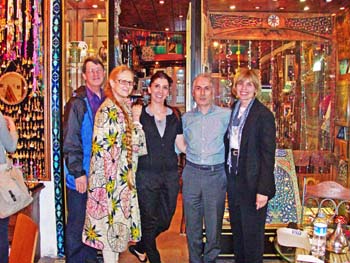
30th April 2010, after the Public Event on Day Three of the conference, we attempted to enjoy the
Covered Bazaar and unexpectedly had a special Open Space Session on the dignity - or rather the lack of dignity - in contemporary economic arrangements with Nebil Basmaci.
• Please click on the picture or here to see more photos from Linda's camera.
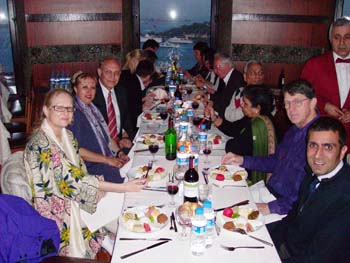
30th April 2010, after the Public Event on Day Three of the conference, we enjoy the
Covered Bazaar and the Galata Tower dinner.
• Please click on the picture or here to see more photos from Linda's camera.
1st May: After the conference


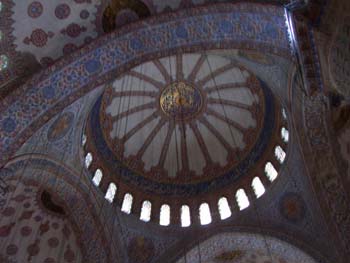


1st May 2010,
Sultanahmet Circle with German Fountain, Column of Snake, Blue Mosque, St. Sophia Palace and Mosque.
• Please click on the pictures at the top or here to see all the photos from Evelin's camera.
• Please click on the picture in the middle or here to see more photos from Linda's camera.
• Please click on the picture further down or here to see all the photos from Sophie Schaarschmidt's camera.
• Please click on the picture at the bottom or here to see all the photos from Ardian Adžanela's camera.
2nd May: After the conference



2nd May 2010,
Turkish hospitality! Hayal Köksal opens her home, and we say good-bye to dear Arif at Kilyos!
• Please click on the pictures at the top or here to see all the photos from Evelin's camera.
20th April: Prior to the conference
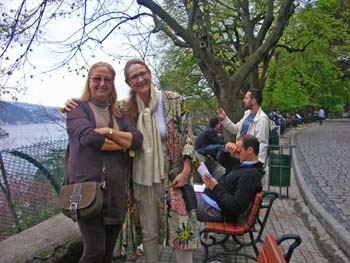
On 20th April 2010, after 4 nights being stranded in Amsterdam, Evelin finally arrived in Istanbul, lovingly welcomed by Hayal, the unbelievably caring and skilled convener of our conference.
Dear Hayal arranged something extraordinary, namely, that Evelin could stay during the first days prior to our conference in the famous Kennedy Lodge on the campus of Bogazici University in Istanbul. It is a large house with a marvelous view of the Bosphorus. Then she invited Evelin for her first lunch in Turkey to the wonderful Takanik Balik restaurant.
Thank YOU, dear Hayal, for such loving care!
Please click on the picture above or here to see more photos.
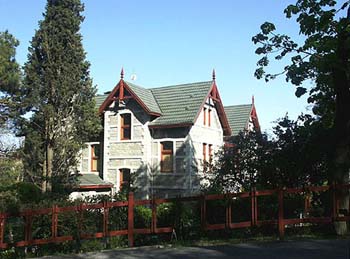
Kenney Lodge, overlooking the Bosphorus, in between two bridges (Fatih Sultan Mehmet bridge in the north and Bogazici bridge further south).
Please click on the picture above or here to see more photos.
21st April: Prior to the conference


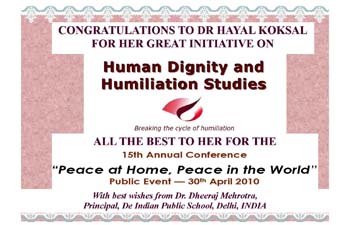
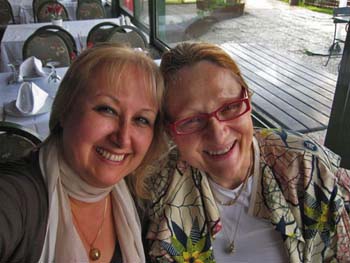
On 21st April 2010, Hayal introduced Evelin to her students at Boğaziçi University.
Afterwards, Hayal invited Evelin to the Vakiftepe (Social Building) of the Istanbul Technical University, overlooking the Fatih Sultan Mehmet bridge. There, they worked on the programme of our conference!
• Please click on the pictures at the top or here to see more photos from Evelin's camera.
• Please click on the pictures at the bottom or here to see more photos from Hayal's camera. See also Hayal's blog.
23rd April: Prior to the conference
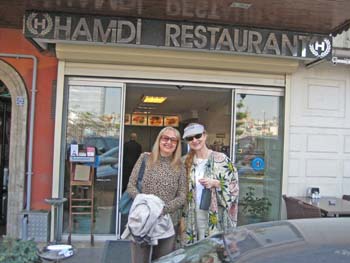
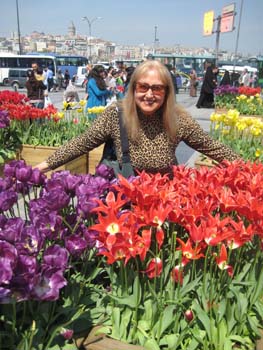
On 23rd April 2010, Hayal took Evelin around in Istanbul, from the Children's Day celebrations to the Hamdi restaurant, and the tulips of Turkey.
Please click on the picture above or here to see more photos from Hayal's camera.
25th April: Prior to the conference
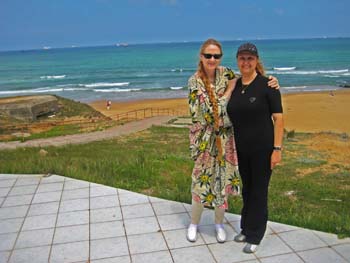
25th April 2010, after a wonderful weekend at Hayal's home, she took Evelin to see Kilyos hotel.
Please click on the picture above or here to see more photos from Hayal's camera.
26th April: Prior to the conference

26th April 2010, first arrivals! See Linda Hartling, Rick Slaven, and Ardian Adžanela. Hayal Köksal and her students (see Uğur Akgün and Salim Ergene on these pictures) helped wherever they could. See also Arif, who wonderfully cared for us in Kilyos hotel! Thank you to you all!!!
Please click on the picture above or here to see more photos from Evelin's camera.
27th April: Prior to the conference



On 27th April 2010, Vineeta Kamran was among the first to arrive, and also Younis Al Khatib, President of The Palestine Red Crescent Society joined us.
• Please click on the picture on the left or here to see more photos from Evelin's camera.
• Please click on the picture in the middle or here to see more photos from Hayal's camera.
See also Hayal's blog!
• Please click on the picture on the right or here to see more photos from Linda's camera.
List of Participants
• Hayal Köksal, Ph.D., President of the Quality & Peace Education Center (Kalbe-Mer) and the Director of the Turkish Center for Schools of Quality, convener of this conference
• Uğur Akgün, Hayal Köksal's student, who very kindly supported our conference
• Murat Altıntaş, Hayal Köksal's student, who very kindly supported our conference
• Salim Ergene, Hayal Köksal's student, who very kindly supported our conference
• Riza Memiş, Hayal Köksal's student, who very kindly supported our conference
• Füge Demirok, sculpturer, member of the Peace Education & Research Center (BUPERC) at Bogaziçi University
• Nur Bekata Mardin, Peace Education & Research Center (BUPERC) at Bogaziçi University
• Fatos Erkman, Associate Professor, President of the Peace Education & Research Center (BUPERC) at Bogaziçi University, and President of the International Society for Interpersonal Acceptance and Rejection, was with us in spirit
• Mert Onur, Friedrich-Ebert-Stiftung Association Turkey Office
• Vineeta Kamran, Principle of the City Montessori School, Kanpur Road Branch, Lucknow, India
• Nazan Moroğlu, author of Human Rights Treaty of Women. She is the general coordinator of the Istanbul Women Associations Unity. She is also giving the course: Women Law” at Yeditepe University, Law school.
• Ramazan Baş, President of the Spinal Cord Paralytics Society of Turkey (SCPST)
• Linda Hartling, Director of the Human Dignity and Humiliation Studies network
• Richard Slaven, Business Manager of the Human Dignity and Humiliation Studies network
• Younis Al Khatib, President of The Palestine Red Crescent Society
• Kailash Tuli, Professor, Ph.D. in Psychology, Gestalt therapist, and his wife Mohini Tuli, Ph.D. in Zoology, New Delhi, India
• Merle Lefkoff, President and Co-founder of the Madrona Institute, Santa Fé, USA
• Ardian Adžanela

Please click here to see all the photos from Ardian Adžanela's camera.
• Sophie Schaarschmidt


• Please click here to see all the photos from Sophie Schaarschmidt's camera.
• Paresh Kathrani, Director, Centre for Global Morality, is currently undertaking his PhD in Refugee Law and Philosophy at the School of Law, Kings College, London
• Moira Rogers
• Maggie O'Neill
• Mari Blikom
• Ulrich Spalthoff and his wife Brigitte Volz
• Anthony McCann, Founder and Director of the non-profit Crafting Gentleness
• Salman Türken (arriving on 29th April)
• Milica Jančulová, The Slovak Republic Government Office Department of Human Rights and Minorities, Bratislava, Slovakia
• Yoav Peck and Avi Shahaf
• Uta Ottmüller
• Victoria C. Fontan (arriving on 1st May)
• Nebil Basmaci
• Arif at Kilyos Hotel
These participants were hindered to join us but were with us in spirit
As always, many people wish to participate in our conferences, however, numerous obstacles stand in the way as time evolves, and they can finally only join us in spirit. They are listed here to honour their presence in spirit!
• Rukiye Hayran, Ph.D., Head of the Positive Psychotherapy Center in Istanbul, was with us in spirit
• Tugba Sari, Ph.D., Assistant Professsor, Head of the Positive Psychotherapy Centre in Ankara, was with us in spirit. Unfortunately, due to the sudden and deeply saddening passing of Professor Nossrat Peseschkian on 27th April, Tugba Sari could not join us.
Please note that Professor Nossrat Peseschkian, the Founder of Positive Psychotherapy, was an esteemed member of our Global Advisory Board. Please be furthermore warmly invited to the 5th World Congress of Positive Psychotherapy Istanbul Turkey 9.-12.Oct. 2010
• Abid Mahmood, President of Peace Educational & Clean Environment Society (Regd), and Shazia Tabassum, Manager Women Wing, was with us in spirit
• Molly Staeheli, English Language Office of the US Embassy in Ankara, was with us in spirit
• Marc Van den Bossche was with us in spirit
• Cigdem Alper, MA in Counseling Psychology, California Institute of Integral Studies, San Francisco 2007,
Diploma in Psychology, Metropolitan University, London 2003, was with us in spirit.
Cigdem Alper worked as a Marriage and Family Therapist at The Center for Healthy Development, Santa Clara leading New Skills and Choices Groups with high conflict parents and worked in the development of the NSC programme curriculum. Currently working as a psychotherapist at The Relationship Psychotherapy Institute providing counseling to families, couples and individuals on issues such as marriage and family problems, relationship issues, divorce, communication, emotion regulation and stress tolerance.
• Elmaze (Eli) Gashi was with us in spirit
• Riva Kantowitz was with us in spirit
• Claire Hershman was with us in spirit
• Ani Kalayjian and Jennifer De Mucci at Meaningfulworld were with us in spirit
• Nefise Özkal Lorentzen was with us in spirit and contributed with two films Gender Me (a road-movie about Mansour’s voyage into the world of Islam) and Det hendte i går, det hender i dag (a documentary film about mutual experiences from war, dictatorship and escape)
• Bård Aune was with us in spirit
• Bosede Florence Awodola, Institute for Peace and Conflict Resolution, Abuja-Nigeria, was with us in spirit
• George Chidieber Iheanacho, Nigeria, was with us in spirit
• Nataly Kelly was with us in spirit
• Maria Rosvoll was with us in spirit
• Demetrios A. Theophylactou, Senior Associate Member at the European Studies Centre (ESC – SEESOX), St. Antony’s College, University of Oxford, recently a fellow at the Weatherhead Center for International Affairs, Harvard University, was with us in spirit
• Antony Adolf was with us in spirit
• Abul Basher Khan, Registrar of the Manarat International University, Bangladesh, with his wife Dr. Farida Easmin Shelly were with us in spirit
Universal Peace: Role of Family, Moral and Peace Education
Abstract to be presented at the 15th Annual Conference of Human Dignity and Humiliation Studies "Peace at Home, Peace in the World," in Istanbul, Turkey, 28th - 30th April 2010
• Amy C. Hudnall and her daughter Megan were with us in spirit
• Kevin Clements and his wife Valerie were with us in spirit
• Astrid & Christoph Rosenau were with us in spirit
• Bertram and Anne Wyatt-Brown were with us in spirit
• Dan Baron was with us in spirit
• Heidi von Weltzien Høivik was with us in spirit
• Maria Dahle was with us in spirit
• Antoinette Errante was with us in spirit
• Zinthiya Ganeshpanchan was with us in spirit
• Kenneth Suslak was with us in spirit
• Carlos E. Sluzki and his wife Sara Cobb were with us in spirit
• Michael L. Perlin and his wife Linda were with us in spirit
• Eugene Schoulgin was with us in spirit
• Chris Bennett was with us in spirit
• Charles Muliya, Zambia, was with us in spirit
• Albert Joe S. Bongay, Chairman Youth Alliance (The Gambia) Charitable Organisation, was with us in spirit
• Yussif Abdul-mumin, co-founder and director of Action for Community Development (AFCODEV) a youth led Organization based in Ghana, was with us in spirit
• Adebisi Adesua and Uzoegbu Chidiebere Stephen, via Stephen Ugwu, Refugee Relief Workers International, Aba, Abia State, Nigeria, was with us in spirit
• Emerenini Gloria Onyinychi, Assistant Programme Officer Society for Promotion of Education and Development (Sped), Lagos, Nigeria, was with us in spirit
• Mariko Thera Korotoumou coming from the Républic of Mali, via Tanga Kabore, Fédération Panafricaine des Associations et Clubs de l'Union Africaine (FEPAC/UA), was with us in spirit
• Ch. Abrar Majid, Ph.D., Director of the Sheikh Trust for Human Development, Lahore, Pakistan, was with us in spirit
• Zimare Samah, Ph.D., Youth Crime Watch of Guinea, a youth-led crime prevention/leadership movement in partnership with schools and communities, was with us in spirit
• James Menjor, Teachers Associated for Peace and Education (tape), a local NGO which is registered and based in Sierra Leone, was with us in spirit
• Yashpal Jogdand was with us in spirit
• Carol Smaldino was with us in spirit and contributed with the abstract Found in Translation: Recognizing all the Shades of Human Feeling and A Human Climate: Shifting through Fear to Connection
• Dakshinamoorthi Raja Ganesan was with us in spirit
• Latha Nrugham sent us the poem "I Refuse to Die. And I Even Refuse to Cry" and the Story of the Blue Ribbon:
 |
| The Blue Ribbon Story |
• Veronica Fynn was with us in spirit
• Miriam Marton was with us in spirit
• Chellie Kew was with us in spirit
• Kit-fai Næss was with us in spirit
• Shan Ruprai was with us in spirit
• Kiyoko Sueda was with us in spirit
• Inga Bostad was with us in spirit
• Adenrele Awotona was with us in spirit
• Dr. Adebola B. Ekanola was with us in spirit. He is a Senior Lecturer in the Department of Philosophy, University of Ibadan, Nigeria. He received a Ph.D degree from the same department in 2003. His Ph.D thesis was on Peace and the Problems of Justice and Group Loyalties in Contemporary Society. Dr. Ekanola has a special interest in the philosophical study of issues relevant to conflict resolution and the attainment of social peace as a prerequisite for sustainable social development in Nigeria and other developing societies. Of the 32 publications to his credit, 25 are on different theoretical issues related to conflict resolution, social peace and social development in contemporary society. He is currently engaged with a project to design a course in philosophy of peace to be taught at the postgraduate level in his home university. He expects that the proposed course would provide an adequate framework for the effective resolution of conflicts and a suitable foundation for enduring peace and social development in contemporary developing societies.
• Mohammad Abul Kalam Azad was with us in spirit
• Rina Kashyap was with us in spirit
• Navaraj Pudasaini was with us in spirit
• Zuzana Luckay was with us in spirit
• Michael Britton was with us in spirit
• Rebecca A. Klein, Don Klein's granddaughter, and her father Alan Klein were with us in spirit
• Jan Øberg was with us in spirit
• Stephanie Heuer was with us in spirit
HumanDignity for Children: Finding a Voice for Dignity
• Jean-Damascène Gasanabo was with us in spirit
• Jacqueline Howell Wasilewski was with us in spirit
• Olav Ofstad and his wife Prahba, Country Representative, Norwegian Red Cross, Serbia, Belgrade, were with us in spirit
• Akhil Ranjan Dutta, Ph.D., Reader in Peace and Conflict Studies Department of Political Science Gauhati University, Assam, India. Akhil Ranjan Dutta was with us in spirit.
Dr. Akhil Ranjan Dutta, Ph. D. (born 1973) is currently Associate Professor in Peace and Conflict Studies, Department of Political Science, Gauhati University, Assam, India. Dr. Dutta obtained his MA and M Phil Degree from Delhi University, India in Political Science and Ph. D. from Gauhati University, India on Human Security and Health Security. Specialized in Political Theory, Political Economy and Human Security Dr. Dutta is also a recipient of Rotary World Peace Fellowship (2009) and undertook a special course on Peace and Conflict Resolution at Chulalongkorn University, Thailand (2009). Dr. Dutta is a regular columnist both in English and vernacular on contemporary political issues and has authored and edited a couple of books including Human Security in North-East India: Issues and Policies (2009) Dr. Dutta wrote his Ph. D. Dissertation on health security and currently engaged in a research project on National Rural Health Mission in India. He is also a Coordinator of National Election Studies and State of the Nation Surveys being conducted regularly by the Centre for the Study of Developing Societies (CSDS), New Delhi.
• Anjali Bhatia, Department of Sociology, Lady Shri Ram College, India, was with us in spirit
• Pandora Hopkins was with us in spirit
• Stein Villumstad was with us in spirit
• Pamela Creed was with us in spirit
• Betty Reardon will unfortunately not be able to join us, but she was with us in spirit. Betty A. Reardon, Consultant to the TCPEC and Founding Director Emeritus. Betty Reardon is recognised world wide as a leading theorist, and designer of pedagogic materials and processes in peace education. She was the recipient of the special Honourable Mention Award in Paris by UNESCO at the Peace Education Prize Ceremonies in 2001. She was the initiator and the first Academic Coordinator of the Hague Appeal for Peace Global Campaign for Peace Education. Having taught as visiting professor at a wide range of universities in he U.S. and abroad, she has 40 years of experience in the international peace education movement and 25 years in the international movement for the human rights of women. She has served as a consultant to several UN agencies and education organisations and has published widely in the field of peace and human rights education, and women’s issues.
• Dharm P. S. Bhawuk and his wife Poonam were with us in spirit!
• Keitaro Morita was with us in spirit!
• Ragnhild Nilsen and her husband Michael Schulte were with us in spirit!
• Jack Goldstone and his wife Gina will unfortunately not be able to join us but will be with us in spirit!
• Hilarie Roseman was with us in spirit!
• Mitja Žagar was with us in spirit
• Chipamong Chowdhury (Bhante Revata) was with us in spirit! He would have liked to come and present his idea to open a subnetwork through our HumanDHS network titled "The Future Hope: An Peace Initiative net work"!
• Irene Banias, Assistant Professor, one of the founders of the Peace Education Center, Bogazici University, Istanbul, Turkey, was with us in spirit. Her talk was titled: The Role of Dignity and Humiliation for the Protectıon of Children's Rights and Its Relatıon to Peace (2009)
• Seema Shekhawat and Debidatta Aurobinda Mahapatra were with us in spirit!
Francisco Gomes de Matos kindly wrote on 22nd January 2010:
Dear Evelin and Hayal, in spirit I'll be joining you in fascinating, historical Istanbul, symbol of Eastern-Western harmony. I'm sure the event will be most dignifying. It will be come a landmark in the history of HDHS. Will send you a message soon. Sunniest regards, Francisco Gomes de Matos, a peace linguist from Recife, Brazil
Francisco Gomes de Matos kindly wrote on 8th December 2009:
THE MOST DIGNIFYING EXPERIENCE I'VE HAD OR SHARED
What would happen if members of the HUMAN DIGNITY AND HUMILIATION STUDY
FAMILY described as briefly as possible (one to two paragraphs)what they
would consider as their MOST DIGNIFYING EXPERIENCE THEY HAVE HAD OR SHARED. Details would be given but actual names of persons involved would not be
used, etc.
Who would benefit from a collection of such accounts? Why?
In the History of Humankind it is INDIGNITY that gets recorded, told,
documented, but how about the bright side, DIGNITY? The time is ripe
to launch a movement for collecting such information, sharing it, and using
it for several purposes: educationally, psychologically, communicatively,
socially, politically, etc.
Francisco
(See also Stories)
Open Space and What It Entails
Donald Klein explained the Open Space design as follows (2006): It involves creating a kind of 'marketplace' of possibilities based on topics nominated by participants. The only requirement is that whoever nominates the topic, acts as the convener of the discussion of the topic and takes responsibility for having notes taken. A report is subsequently made about the essence of what was discussed, including any conclusions or recommendations, at a plenary session following the topic groups.
The Open Space design has the advantage of focussing on whatever is of greatest interest to participants at the moment. It allows for parallel discussion of multiple topics, followed by a period of sharing and general discussion.
Alan Klein kindly wrote (31/10/2005): One of the key elements in making an OS event successful is the focusing of the question that the participants respond to. Another is being clear about what will be done with the information presented and/or decisions made in the OS event itself.
I would like you all (and any others who should be involved in this as well) to begin thinking and dialoguing about what would be the most question that you would most like to see grappled with by the participants. This may or may not include a sense of the decision(s), or type of decision(s) that you want the participants to come to or you may decide that the OS event is just for gathering and focusing energy and not to some to any decisions.
Thanks,
~Alan
On 14th December, 2005, we had a Board Meeting in NY:
We discussed our Open Space Section. Don explained that we could have different levels, a more open and general level and a more focused level. At the more open level we would discuss what is on our minds, at the more focused level, we would form 'buzzgroups' on particular topics, such as business, research, education, fundraising, non-profit.
Don Klein kindly wrote (30/12/2005):
[...] The main point I recall dwelling on at some length had to do with deciding first on the content of a session and its purpose; then deciding what meeting technology to use. Open Space is often used when the purpose is to make it possible for individuals to focus on aspects of a general topic that are of special interest to them. The participants themselves choose what they want to discuss. No one knows in advance how many groups there will be and what they'll be discussing.
Buzz groups are used as a way to break a large meeting down into smaller sections (usually from six to twelve or so people). All the buzz groups can be assigned the same topic; or different buzz groups can be assigned different aspects of the same topic; or buzz groups may be divided among two or more different - usually related - topics.
The main point is to decide what is to be the topical focus and what outcomes are desired from a session. Then pick the technique that promises to help us achieve the purpose.
Love, Don
Sophie Schaarschmidt kindly wrote (02/01/2006):
What I would suggest for a following workshop (and this is my very personal view) is to create discussion forums as open choices. The open space technology as I know it, and as it is used mainly in the field of training involves participants in a unique way. The first step is like an open brainstorm session involving all participants. In this session, participants can come up with a topic that they want to (present and) discuss. All topics are written down and similar topics might be combined into one topic. This process can happen either beforehand via email or a web-forum or at the workshop on a blackboard. Once the discussion topics are defined the person that proposed a certain topic would announce a time and a space when and where the topic will be discussed. In a full day of open-space, up to 50 topics could be discussed. People are free to join and leave a discussion. As a metaphor, people are like bees flying from one topic to another, participating in a discussion as long as it feeds their interest and taking the honey from it as well as contributing to it, and leaving the discussion when it takes a turn into a direction that they are less interested in or when they wish to participate in other discussions on other topics as well. Normally people take part in 3 to 10 discussions a day. Therefore, people are free to select the topics they are interested in and move to other discussions, as listener or both, listener and contributor. Each discussion group is also free in putting their time frame, and scheduling breaks. Of course, there should be a time frame for the open-space session, let's say it would take place from 1pm to 5pm in the afternoon. Yet, discussion groups can schedule their space (location), time frame (a discussion could last half an hour or three hours: as much as it takes to explore the issue) and breaks themselves. The only condition is that the discussion topic, its location and starting time will be announced (or written down on a public board) so that all participants know when which subject will be discussed where.
I participated twice in such an open-space session and I was very much impressed by its power and evolving possibilities. Not only were people more active, excited and engaged, taking little breaks, but also people felt they could gain and contribute most in this process. They felt they were free to choose which discussions to engage in, and it was an easy way to make contacts with those people interested and engaged in topics similar to one's own. By being able to set an own time frame discussions were deeper than usual, and by participants moving from one topic to another, joining (and making new contributions) or leaving a discussion the discussions stayed vivid and interesting, and many perspectives could be shared. At the end of a discussion each group filled in an A4 page which contained the title of the discussion group, a list of the names of the people who contributed in the discussion, and a summary of what was discussed (the main stances). All the discussion summaries can be combined to a book at the end of the conference providing people with a tremendous treasure of topics and insights.
Another advantage of the open-space technology (as I experienced it) is that people stay 'fresh' in the workshop. The discussion excites and revives people and forms a good basis for getting to know each other and going on with the discussions at a later time in the workshop (e.g. during lunch).
It might be worthy to try the open-space technology in a HumanDHS workshop meeting substituting the round table sessions, or in addition to them. The only difficulty I'm aware of might be that we would need many spaces (rooms) where the discussion groups could spread for their discussions.
[...]
Good luck for your work in 2006!
Yours warmly,
Sophie Schaarschmidt
Linda M. Hartling kindly wrote in response to a message from Carlos Sluzki (21/01/2006):
How do we maximise the quality of work together when we are a group of individuals with dramatically varying levels of experience? This is such an important topic I think we should discuss it at our next meeting in Costa Rica. Perhaps, we could use some of our Board meeting time to discuss this? In addition, perhaps we could use some of our 'open space' time to explore people's view of this dilemma? I suspect that all of us involved with the operations of this network share a desire to optimise our efforts, to move the work forward efficiently and effectively. When we use an all-inclusive format at our meetings, we risk back tracking and dealing with questions that have obvious answers (e.g., convincing some newer attendees of the significance humiliating behavior). (...) In the words of Peter Drucker, I would like to see our group create conditions that 'strengthen our effectiveness and make our weaknesses irrelevant'. But, how do we do this in a way that promotes the dignity of all the people who attend our meetings? I'm trying to think of some examples of organisations that do this... perhaps, Linda Stout's Piedmont Peace Project? Not too long ago I read a book entitled, 'The Wisdom of Crowds', which I think is relevant to our questions about inclusion/exclusion. It
describes the conditions for 'wise crowds'. (Surowiecki, J. (2004). The Wisdom of Crowds: Why the Many Are Smarter Than the Few and How Collective Wisdom Shapes Business, Economies, Societies, and Nations. New York: Doubleday.)
Don Klein kindly responded (28/01/2006):
I very much support the focus on where we want to go. Suggest working in interest groups part of the time: i.e., education, research, civic action, global community building. And include a way for groups to emerge around other areas of interest. for that matter, if only one person had an
interest and wanted to develop it further and then share his/her thoughts with us, that might also be possible.
Love, Don
Don Klein kindly wrote (28/01/2006):
I'd like to offer some experiences with the network originally known as National Training Laboratories. This network, begun around 1950, is sstill in existence today; it has changed, however, in ways that seem relevant to the issues raised.
The network originally was a group of 'originators' of theory and practice in the area of group dynamics. Most of them had participated in the discovery of 'sensitivity groups' or the t=group method. After almost a decade, the more experienced people in the network became Fellows, as distinct from ordinary Members of the network. To admit someone to their membership, all the Fellows had to agree that the applicant's credentials merited inclusion in the Fellows. During t his initial period, which lasted about ten years, selected members of the network participated as staff members of two and three-week training programs for the general public, using the t-group method. An enormous amount of theory building took place as faculty spent three or four days preparing each of the training labs. It should be noted that most of the network were academics engaged in one or another of the social sciences, in areas related to democratic participation in social change. They were all motivated by their common passion and some of them felt that the two or three weeks they spent with their colleagues from around the country were the most meaningful and exciting of the entire year.
In the 1960s, questions arose about the suitability of having a 'class' system in the network. The Fellows were seen as an anti-democratic perversion of the ideals and purposes of NTL. And so the Fellows class was discontinued.
At about the same time, financial difficulties led to a reorganisation of NTL, which included dissolution of the existing netework and inviting a more diverse group (sex, race, and ethnically) to form a new network. The theory and practice of Organisation Development, meanwhile, had emerged and more and more of NTLs network members became engaged in OD practice, while fewer and fewer network members were engaged in academic pursuits.
In my view the social impact and creativity of the current network have been reduced by NTL's growing emphasis on operating profitably as a 'business'.
There is currently an upsurge (how strong we don't know) of those wishing to advocate working on participative ways to democratise our institutions and our society. Some of the network members are placing an increased emphasis on creating an international network and of promoting global community.
A major point in all of this history for me is that there is no 'ideal' and certainly no 'absolute' way of resolving questions having to do with competency, interest, and inclusion. Based on the above history, my inclination is to favor the 'class' system; i.s., creating a group of qualified researchers, practitioners, and policy shapers to work together to shape, participate in, and contribute knowledge and skills to the work of HDHS network, including those activities that enable it to raise money by grants, contracts, income from training programs, and contributions.
These comments are lengthy. I hope they're helpful.
Love,
Don
Linda M. Hartling kindly wrote (27/04/2006):
In terms of Open Space...I think we should have some of the same groups we had in Berlin, with room for a couple of new groups. For example, we could have an education group, a research group, a business group, etc. It would be helpful to have these key groups continue their discussions, rather than creating all new groups. Didn't we talk about having 'buzz groups', meaning groups addressing topics that people want to continue to move forward? The education, research, and business groups could be buzz groups.
The following Dignilogue topics were proposed in different conferences, yet, the facilitators are unable to come. The topics are listed here, because they might inspire you.
• Giving Voices to the Environmentally Humiliated and Misrecognized: Nature and Women by Keitaro Morita (adapted from a similar presentation at the 9th Annual Conference of Human Dignity and Humiliation Studies in Hangzhou, China, 13th-16th April 2007)
• Peace: A World History, by Antony Adolf (2009)
• Native Hawaiian and Polynesian Communities, by Dharm P. S. Bhawuk and Neil Ryan Walsh (Neil was unfortunately hindered to join us) (2009)
• Familiarization and Its Ways: Is Ragging/Bullying an Archaic Method of Interaction, by Harsh Agarwal (2009)
• Humiliation and Dreams, a talk/session by Dakshinamoorthi Raja Ganesan (2009)
• Asian Religious Worldviews and Alienation, and/or Alienation and Dreams, a talk/session by Dakshinamoorthi Raja Ganesan (2009)
• Video Series of the Causes and Patterns of Humiliating Experiences Through Role Play by Dakshinamoorthi Raja Ganesan (2009)
D. Raja Ganesan kindly wrote on January 15, 2009: 'I take this opportunity to suggest that a video series of the causes and patterns of humiliating experiences through role play of well established principles of social psychology--both culture free and culture fair--through role play and simulation be taken under the auspices of our group'.
• Intercultural Research, faciliated by International Academy of Intercultural Research (IAIR) researchers (2009)
Papers
All participants are warmly invited to send in papers.
Please notify us, if you wish to submit any of your papers also as a book chapter or as a journal article.
Please see earlier submitted papers here:
• List of All Publications
Ardian Adžanela (2010)
Human Dignity and Humiliation in the Context of Post-War Society of Bosnia and Herzegovina
Presentation given at the 15th Annual Conference of Human Dignity and Humiliation Studies "Peace at Home, Peace in the World," in Istanbul, Turkey, 28th - 30th April 2010
Nazan Moroğlu (2010)
Türkiye’de Kadının İnsan Hakları - Women’s Human Rights in Turkey
Presentation given at the 15th Annual Conference of Human Dignity and Humiliation Studies "Peace at Home, Peace in the World," in Istanbul, Turkey, 28th - 30th April 2010
Hayal Köksal (2010)
Human Dignity Through “Peace at Home, Peace in the World”
Presentation given at the 15th Annual Conference of Human Dignity and Humiliation Studies "Peace at Home, Peace in the World," in Istanbul, Turkey, 28th - 30th April 2010
Evelin Gerda Lindner (2010)
From Shock to Awe: The World on a Trajectory from Humiliation to Dignity - A List of “Factoids”
Abstract for the lecture presented at the 15th Annual Conference of Human Dignity and Humiliation Studies "Peace at Home, Peace in the World," in Istanbul, Turkey, 28th - 30th April 2010
Paresh Kathrani (2010)
Inside or Outside: Asylum Seekers on the Periphery of Borders
Paper presented at the 15th Annual Conference of Human Dignity and Humiliation Studies "Peace at Home, Peace in the World," in Istanbul, Turkey, 28th - 30th April 2010
Abul Basher Khan (2010)
Universal Peace: Role of Family, Moral and Peace Education
Abstract presented at the 15th Annual Conference of Human Dignity and Humiliation Studies "Peace at Home, Peace in the World," in Istanbul, Turkey, 28th - 30th April 2010
Adebola Ekanola (2010)
Philosophy of Peace and the Evolution of a Culture of Peace in a Developing Society
Abstract presented at the 15th Annual Conference of Human Dignity and Humiliation Studies "Peace at Home, Peace in the World," in Istanbul, Turkey, 28th - 30th April 2010
Carol Smaldino (2010)
Found in Translation: Recognizing all the Shades of Human Feeling
Abstract presented at the 15th Annual Conference of Human Dignity and Humiliation Studies "Peace at Home, Peace in the World," in Istanbul, Turkey, 28th - 30th April 2010
Uta Ottmüller (2010)
Transgenerational Legacies of Collective Violence. Observations from Germany
Abstract presented at the 15th Annual Conference of Human Dignity and Humiliation Studies "Peace at Home, Peace in the World," in Istanbul, Turkey, 28th - 30th April 2010
Kailash Tuli (2010)
Humiliation in the Indian Context: Effectiveness of Zeitgeist to Inculcate Human Dignity
Abstract presented at the 15th Annual Conference of Human Dignity and Humiliation Studies "Peace at Home, Peace in the World," in Istanbul, Turkey, 28th - 30th April 2010
Irene Banias (2010)
The Role of Dignity and Humiliation for the Protectıon of Children's Rights and Its Relatıon to Peace
Abstract presented at the 15th Annual Conference of Human Dignity and Humiliation Studies "Peace at Home, Peace in the World," in Istanbul, Turkey, 28th - 30th April 2010
How to get to the conference venue, and where to stay
• How to get to Istanbul and the conference venue (see Istanbul Photos "Is it possible not to like that city?" by Dilek Ozçelik)
You had to fly to İstanbul International Ataturk Airport (IIAA)
There are subway, taxi, and buses from the airport to Taksim. Since arrival times for participants are very varied, no shuttle bus could be arranged. However, for departure, Hayal Köksal arranged for collective transport.
• To go to the Kilyos Burç Hotel on the Saritepe Campus of Bogazici University, the most inexpensive way, for those who have little luggage, is to take the “airport bus / shuttle” named HAVAŞ to Taksim and then either use metro (subway/underground) to the last stop and then take a taxi or directly take a taxi from Taksim.
Hayal Köksal prepared a map for you to print out that any taxi driver can understand. Ataturk International Airport is on this map and the Kilyos Burc Hotel (Social Building), at Kilyos Saritepe Campus, Boğaziçi University, Uskumrukoy, Kilyos, Istanbul. You could follow TEM Autoway and go to Kilyos. If you wanted you could take a shuttle (HAVAŞ) from the airport to Taksim and then get a metro (subway) to 4. Levent and then take a taxi from 4th Levent to Burc Hotel. See also another map of the Kilyos Burç Hotel.
• If you arrived on 25th or 26th April, Hayal Köksal arranged for a Tour Company (Klas-Tur) to pick you up with a car from the International Atatürk Airport upon your request. The fee was less expensive than the ordinary cabs. But you had to be sure to have Turkish currency (Turkish Lira, TL). You could get it from the Currency Shops and Banks at the Airport. If you informed us about your arrival time, they were waiting for you after the Customs. The cost was 150 TL (around 75€/100$) which is cheaper than the Airport Taxis.
• If you arrived on 27th April, 2 shuttle minibuses were organised by Hayal Köksal - one at noon, one in the afternoon - planned for your arrival times. Thank you for letting us know your arrival times. Those minibuses are for 14 persons and one way transfer is 200 TL (100€/133 $). This was shared with all colleagues who also went to Kilyos Burç Hotel. In this way, it was more reasonable for everybody.
• For departures, the same prices and same procedures were valid. Again, the most improtant point was that you inform us about your arrival/departure dates and hours, and if you wished to have the shuttle/cab service!
Please see here the distance-price list of the important venues by taxi and shuttle:
| Distance (Mile) | Taxi Price (€)(+ -) | Shuttle Price (14 persons) (€)(+ -) | |
|---|---|---|---|
IIAA- B.U., Kilyos Burç Hotel |
35 |
45 |
105 (total) |
IIAA- Taxim Hill Hotel |
15 |
20 |
- |
IIAA- Boğaziçi University |
19 |
25-30 |
- |
Kilyos Hotel- Boğaziçi University |
17 |
20-25 |
75 (total) |
Taxim Hill H.-Boğaziçi University |
8 |
12 |
- |
Notes:
• During the conference days (28-30 April) after the day's program, a shuttle could take those who wanted to go to a touristic, historical, or shopping site, and then back to Kilyos Hotel. Such a minibus tour costs 150 Euros.
• In case the number of participants increased, new alternatives emerged. In other words, the shuttle prices given above must be considered as tentative, just to give an idea.
• Where to stay in Istanbul
1. Boğaziçi University, Kilyos Campus, Kilyos Burç Hotel, Sarıyer, Istanbul:
Hayal Köksal arranged with the Bogazici Kilyos Burç Hotel to open in April only for our conference. It belonged to us alone, and even a Turkish night beach party could have been organised if time had permitted. The Bogazici Kilyos Hotel is for instructors and professors, and altogether up to 70 people can stay on the Kilyos campus. A shuttle carried us to the conference venue and all other destinations. The hotel is by the Black Sea and it is possible to swim in April if the weather is nice. The Kilyos campus is the newest and smallest campus of Bogazici University, situated in Kilyos, a small beautiful resort village on the Black Sea coast of Istanbul.
Available are double rooms with one double bed or two single beds (25 or 35 Euros per bed) with the possibility to add a third bed, and there are single rooms with a double bed (35 Euros). Everything included breakfast. Only the cost for the shuttle is not included. Internet access was available.
Dear Hayal Köksal collected the names of all those who were interested, thank you for emailing her.

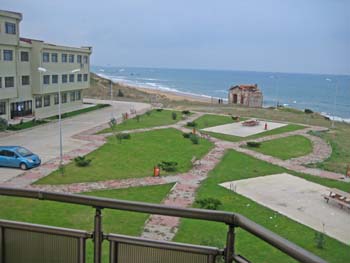
Hayal Köksal kindly took some pictures of Kilyos Burç Hotel in October 2009. Please click on the pictures above or here to see more photos.
2. Taxim Hill Hotel, Taksim/Beyoğlu, Istanbul
For those who wish to be more in the centre of Istanbul, Hayal Köksal kindly pre-reserved 25 double rooms for 27th April-2nd May 2010 in the Taxim Hill Hotel.
A single room is 85 Euros, a double room is 105 Euros, including open buffet/American breakfast on the roof, and VAT. Those who wished to reserve their rooms were kindly asked to do this by giving their credit card number to the registration:
Ms. Nazlı Hülya Soydan: email, and
Ms. Nurdan Kılıç: email.
Direct Tel: +90 212 334 85 88. Address:
Taxim Hill Hotel,
Sıraselviler Cad., No.5,
Taksim, Istanbul,
Tel: +90 212 334 85 00,
Fax: +90 212 334 85 98.
• Post-conference tours
For the 1st and 2nd May, Hayal Köksal informed us about Istanbul and Bosphorus tours. Whoever wished to extend their holidays to Cappadocia, Ephesus or Antalya, Hayal was so kind to assist. For the following tours, you were kindly asked to contact Mr. Kubilay Demirsöz at Fora Tourism via email.
If you wished to use the services of Fora Tourism, the list below showed the options for our participants to mark their choices. For the post-conference tours, you were kindly asked to contact Hayal Köksal. If you had any further plans, you could also contact Kubilay from Fora.
DAY |
HOUR |
PLACE |
PRICE -€ |
YOUR CHOICE |
||
30th April |
14.30-17.30 |
Covered Bazaar Tour Beyazit |
25 |
yes |
no |
maybe |
19.00-22.00 |
Galata Tower dinner & Turkish Night |
? |
yes |
no |
maybe |
|
1st May |
Full day |
Istanbul Sultanahmet Tour (check also further down) |
35 |
yes |
no |
maybe |
1-2 May |
2 Full days |
Gallipoli & Troy Tour |
145 |
yes |
no |
maybe |
More alternatives:
ISTANBUL TOUR / 1 DAY * Program: Sultanahmet Circle (German Fountain, Column of Snake, Blue Mosque, St. Sophia Palace and Mosque, Underground Cistern * Luxurious Buses (To be organized according to the participant number) * Professional Guidance service. Prices (1 person): 35 € (14 seated minibus/10 persons min.) 30 € (27 sated midi bus/ 20 persons min) |
|---|
IZMİR – KUŞADASI TOUR / 2 NIGHTS – 3 DAYS Program: Izmir (Smyrna ) City Center, Şirince Village, Ephesus Antics City, Seljuk (Aydın), Seljuk Open air Museum St. Mary’s House Visit (Pilgrim), St. Jean Church. * Luxurious Buses (Organized according to the participant number), * Accommodations at 3* & 4* star hotels including breakfast and dinner (HB), * Professional Guidance service. Prices (1 person): 240 € (14 seated minibus/10 persons min.) 200 € (27 sated midi bus/ 20 persons min.) 180 € (46 seated coach / 30 persons min) |
CAPPADOCIA TOUR / 2 NIGHTS – 3 DAYS * Program: Hacı Bektaş-i Veli Tomb, Avanos Ceramics Ateliers, Zelve Open Air Museum, Paşabağ Fairy Chimneys, Göreme Open Air Museum, Uç Hisar Castle, Asmalı Konak, Ürgüp, Wine Cellars, Derinkuyu Underground City Tour, Ihlara Valley. * Luxurious Buses (Organized according to the participant number) * 3* & 4* star hotel accommodation (Half Board), * Professional Guidance service. Prices (1 person): 240 € (14 seated minibus/10 persons min.) 200 € (27 seated midi bus/ 20 persons min.) 180 € (46 sated coach / 30 persons min) |
BELIEF TOUR / 3 NIGHTS – 4 DAYS * Program: Bergama Antics City (Bergama), Thyateira (Akhisar), Smyrna (Izmir), Ephesus Antics city: Seljuk (Aydın), St. Mary’s House Visit (Pilgrim), St. Jean Church, Leodikeia (Denizli), Philadelphia (Alaşehir), Sardes (Salihli). * Luxurious Buses (Organized according to the participant number) * 3* & 4* star hotel accommodation (Half Board), * Professional Guidance service. Prices (1 person): 300 € (14 seated minibus/10 persons min.) 250 € (27 seated midi bus/ 20 persons min.) 220 € (46 sated coach / 30 persons min) |
• Please kindly note that...
• There is no registration fee for our conferences. To cover our expenses, we always summarise the costs during the conference and invite participants to contribute according to their ability. This collaborative approach to financing allows us to keep the conference affordable for all.
• We like to get to know participants prior to our conferences and workshops, and prior to issuing an invitation.
• All our gatherings are by invitation only, please approach us so that we can include you and register you.
Only our Public Events are open to everybody without registration.
• The Non-Public Parts of our gatherings have limited enrollment.
• Participants are encouraged to find their own sources of funding or economic support to participate in our conferences. We offer our nurturing work as our gift of love and care to you, and we
would like to lovingly invite everybody to contribute to this gift economy. If you need funding for your travels and housing, please inquire in your country and your university about possibilities. See, among others, for the US, www.supportcenter.org and www.foundationscenter.org. The Weinstein International Fellowship program, inaugurated in 2008, provides opportunities for individuals from outside the United States to visit the U.S. to learn more about dispute resolution processes and practices and to pursue a project of their own design that serves to advance the resolution of disputes in their home countries.
• Participants in our conferences are kindly asked to handle all of their travel arrangements and required documentation, including requests for visas, on their side. HumanDHS is a volunteer initiative and does not have the staff or resources to assist with visa requests.

















































